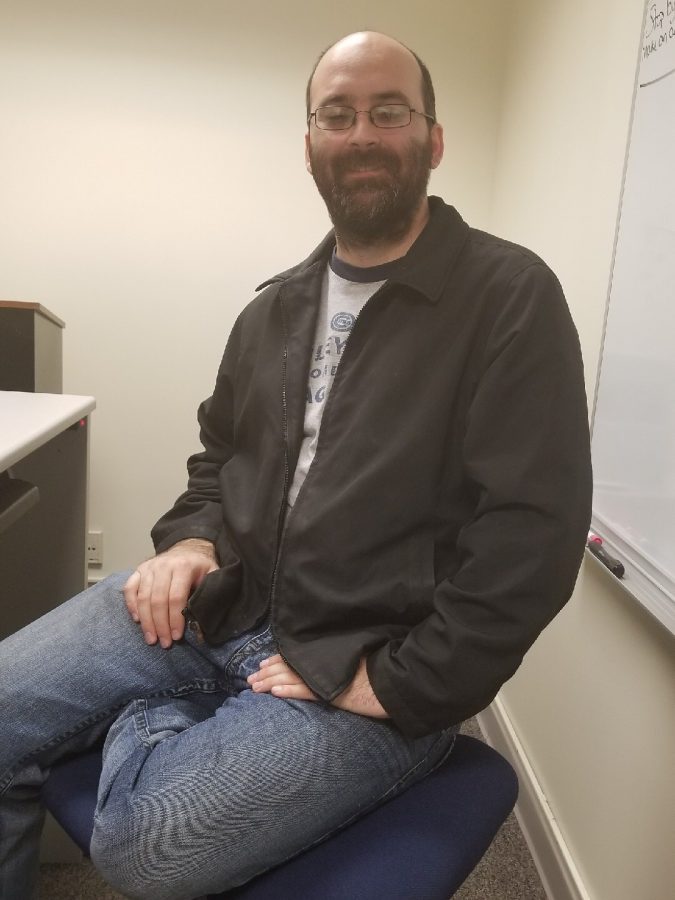Cancer couldn’t keep LLCC professor from living his life
January 22, 2018
“I don’t see myself as a survivor,” former cancer patient Benjamin Cox said.
The English professor at Lincoln Land Community College in Jacksonville and Beardstown survived testicular cancer while an undergraduate student. He went on to work as a journalist for 10 years, and despite worries that cancer would keep him from having children, he is a father of two with a third on the way.
Cox first found out he had cancer during a weekend break in October.
Cox’s family has a history of cancer, his first cousin is unable to have children after having stage 3 testicular cancer. For that reason, Cox had regular self-checks and found a lump. He went to the family doctor who diagnosed him with stage 1 testicular cancer.
“I was taking the most radiation a person can take,” Cox said.
Cox said he lost all of his hair from the chest down due to the radiation and with the lack of ability to eat during treatments, Cox lost 30 pounds in a month.
While he was undergoing treatments, Cox was taking a full class schedule at the U of I, although he did gain a handicap excuse allowing for guided individual studies.
Cox was given full-blown radiation treatments as a preventable measure in the lymph nodes. He was given 30 treatments because they wanted to try to preserve his ability to have children later on in life.
He did have his sperm frozen as a precaution, but today, he has a 2-year-old and a 3-year-old, with one more on the way.
Cox said it was a lonely time. The one person he did enjoy talking to was the nurse, with whom he made friends, exchanging numbers and conversing via text and email.
Cox said he ended up going through the treatments alone because he pushed his mom away from him during this time. He said he thought he needed to go through this by himself. Before he was diagnosed, he had a very close relationship with his mother, but when he told her that he wanted to go through this alone, it hurt their relationship for a time.
Cox said he did also have a few close friends at the time, but they kept their distance “because they didn’t know how to treat him,” he said.
Before cancer, he was also religious, but he lost respect for a lot of people that went to his church during that time because they abandoned him when he needed their help.
“I actually gained more respect for people outside of my religion as my doctor was a Hindu and used to say to me during treatments ‘You have a good Chakra on you,’ “ he said.
Before he was diagnosed with testicular cancer, he had also been diagnosed with clinical depression since he was in high school and came into effect when during the middle portion of the treatments, he started drinking and couldn’t stop for a time. He also stopped going into class and started procrastinating after skipping said classes and went from Dean’s list to Academic Probation.
“I didn’t have the balance and it took a full calendar year for me to get it back to where it should’ve been,” Cox said.
Thomas Beck, a clinical supervisor with a master’s in counseling, said people who are diagnosed with serious diseases tend to fall into bad habits like drinking heavily or doing drugs. Beck also said that regret is the main motivator for people who get addicted to drugs after a traumatic event like surviving cancer. The regret can come from many things, but the most common reason why they feel regretful about surviving an event like this is that they feel like they didn’t deserve to, that there are better people in the same situation that should’ve survived instead.
Cox believes he was able to survive because he caught cancer early. He was given a 98 percent chance of surviving. He said while in the waiting room for treatment, he encountered little kids playing with toys who were not as lucky in their fight with cancer.
People tell him to go ahead and talk to others about what it feels to survive cancer, he refuses to because “I wasn’t changed permanently like those that barely survive.” Cox said he never lost an organ or went bald and believes that those people that go through that are the real survivors.
“It made me more empathetic and appreciative of life and personal strength knowing I could get through any obstacle,” Cox said.
Noah Miers can be reached at [email protected].
